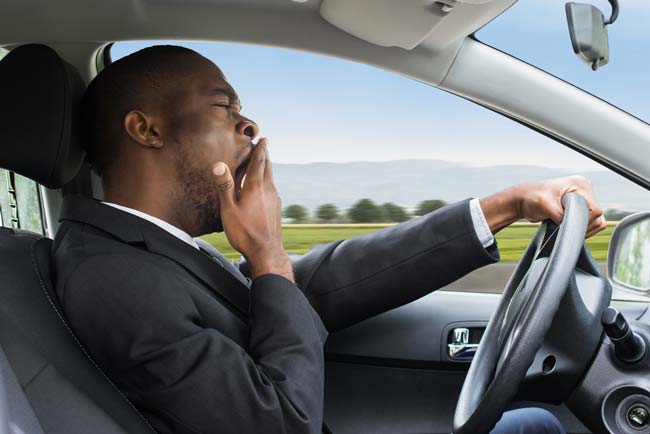When you think about distracted driving, you probably think of texting while behind the wheel. But there are many other distractions that can be just as dangerous.
In fact, an AAA study found that drivers who get behind the wheel after missing one to two hours of the recommended seven hours of sleep have double the risk of crashing.
The numbers get even worse — drivers who missed two or three hours increased their risk of crashing by 400 percent!
Here’s what you should know about driving while drowsy.
Drowsy driving is a major danger
You probably think about drunk driving as one of the most dangerous things you can do on the road. But in reality, driving while tired can be just as lethal.
The AAA study mentioned above also found that drowsy driving is a factor in one-fifth of all fatal crashes.
In fact, there are parallels between drowsy driving and drunk driving. The crash rate for drivers who sleep for only four to five hours is similar to the risk of driving with a blood alcohol level equal to or slightly above the legal limit in the United States.
Drowsy driving is common
A National Sleep Foundation poll found that 60 percent of all adult drivers — or approximately 168 million people — reported driving a vehicle while feeling fatigued in the past year.
More than one-third of people polled reported actually falling asleep behind the wheel. And 4 percent (approximately 11 million drivers) reported having an accident or near-accident because of falling asleep while driving or being too tired while driving.
AAA reports that an estimated 328,000 crashes each year can be attributed to a drowsy driver.
Certain groups are at a greater risk of drowsy driving
Populations of people that don’t get a lot of quality sleep are most at risk for driving while drowsy.
This includes shift workers, who are more likely to drive while tired than those who work a regular daytime shift, and adults with children in the household. (This is no surprise to fatigued parents!)
Studies have also shown that men are more likely than women to drive while drowsy and to fall asleep behind the wheel — and adults between ages 18 and 29 are the most likely age group to drive drowsy.
Why is drowsy driving dangerous?
Driving while sleep-deprived or fatigued can have many effects on a driver. Fatigued drivers are more likely to:
- Fall asleep behind the wheel
- Be distracted
- Be slower to react
- Be prone to making dangerous decisions
- Drift out of their lanes or off the road
- Not stop at traffic signals or stop signs
Would you recognize the signs of drowsy driving?
When you find yourself sleep-deprived, you may not even realize that you’re too sleepy to drive. But there are a number of signs that you shouldn’t be behind the wheel. These include:
- Frequent yawning
- An inability to keep your eyes open
- Drifting into other lanes
- Slowed reactions
- Feelings of irritability or restlessness
- Rubbing your eyes
- Struggling to remember milestones you’ve passed along the drive
What to do to fend off drowsy driving
There are steps you can take to limit the risk of driving while drowsy. The first — and most obvious — is to make getting enough quality sleep a priority.
Beyond that, though, you can:
- Make certain to get a good night’s sleep prior to a long trip.
- Schedule long drives for hours you’re usually awake.
- Take frequent breaks while traveling for a long distance.
- Talk with your doctor about alternatives to medications that make you sleepy.
- Avoid taking medications that make you sleepy before getting on the road.
- Travel with another driver for long trips who can take over behind the wheel and help keep you alert while driving.
- Drink coffee or another caffeinated beverage if you’re feeling drowsy — and don’t resume driving until the anti-fatigue effects of it set in.
- If your fatigue is extreme, stop driving. Call someone to pick you up, or stay overnight in the location if you’re driving somewhere long-distance.
Do you find you’re persistently fatigued but don’t know why? Your doctor can help identify any underlying causes in a regular checkup. Find a doctor here.






